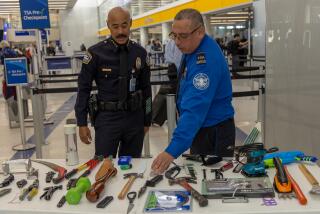Medvedev warms up toward U.S. on visit
Russian President Dmitry Medvedev, arriving in Washington for international economic talks, Saturday struck a conciliatory tone toward the United States and expressed hope that President-elect Barack Obama will help improve the deteriorating U.S.-Russian relationship.
Medvedev, who spoke defiantly of the United States hours after Obama was elected, told an audience at the Council on Foreign Relations in Washington that Russia believes Obama will act to overcome problems that have been accumulating in the relationship between the two countries. He said he believed that a meeting with Obama should take place soon, and felt that Obama shared that view. Obama has said that he wants better ties with Moscow.
In his Nov. 5 speech, which was widely taken as a challenge to the incoming U.S. president, Medvedev signaled that Moscow was ready to deploy missiles near Poland in response to U.S. plans to build a missile defense system in Poland and the Czech Republic.
He clarified Saturday that his government had no intention of delploying missiles at the present, but reserved the right to respond to the missile defense system. Russia considers the system a first step toward countering its huge missile arsenal, though U.S. officials insist that it is intended to deal with what they say is a potential missile threat from Tehran.
“We will not do anything until America takes the first step,” said Medvedev, who took questions from former Secretary of State Madeleine Albright and others. “Hopefully a new president and a new administration will have a willingness to deal with this problem.” Medvedev lamented that there was “no trust” in the U.S.-Russian relationship.
The Russian leadership has been eager to engage Obama’s team as soon as possible on the missile defense issue and other matters, including concern over Georgia’s breakaway republic of South Ossetia.
Obama has been more cautious on the missile defense system than have Bush administration officials, saying he would consider supporting it if there was proof that it will work. Some scientists question whether the system, not yet complete, will be effective.
Though some Obama advisors have been urging a more conciliatory course, it would be difficult for the new administration to quickly defuse the difficult issues, analysts say. Obama will not want to make any concessions that would be seen as abandoning Eastern European allies such as Georgia and Ukraine.
Medvedev also made a pitch for a new European security organization that would include all of Europe, Russia, the United States and Canada, and would not replace current security groups such as the North Atlantic Treaty Organization. He said such a group could have helped avoid the war in Georgia in August by providing a forum for discussion.
Medvedev said Russia had little interest at the moment in joining NATO, pointing out that NATO had considered, but rejected, the idea of integrating Russia in the early 1990s.
“Now, the situation is a bit different,” he said. But he added that Russia has not ruled out the idea for all time, saying “never say never.”
--
More to Read
Start your day right
Sign up for Essential California for news, features and recommendations from the L.A. Times and beyond in your inbox six days a week.
You may occasionally receive promotional content from the Los Angeles Times.







